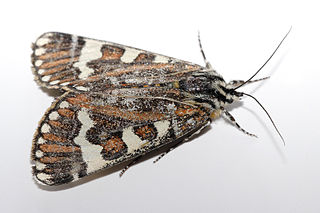
The pasture day moth is a species in the moth family Noctuidae which is active during the day, as its common name implies, making it unlike most other noctuid species. It is found in most southern areas of Australia, ranging from lower Queensland to Tasmania. The species was first described by George French Angas in 1847. It is the only species in the monotypic genus Apina, erected by Francis Walker in 1855.

Orgyia is a genus of tussock moths of the family Erebidae. The genus was described by Ochsenheimer in 1810. The species are cosmopolitan, except for the Neotropical realm.
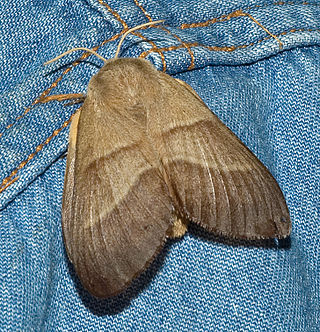
The Lasiocampinae are a subfamily of the moth family Lasiocampidae. The subfamily was described by Thaddeus William Harris in 1841.

Thalaina clara, or Clara's satin moth, is a moth of the family Geometridae. The species was first described by Francis Walker in 1855. It is endemic to south-eastern Australia.

Pinara is a genus of moths in the family Lasiocampidae. The genus was erected by Francis Walker in 1855.

Nataxa flavescens, the yellow-headed anthelid, is a species of moth of the family Anthelidae first described by Francis Walker in 1855. It is found in Australasia.
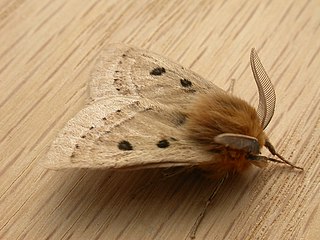
Anthela ocellata, the eyespot anthelid, is a moth of the family Anthelidae. The species was first described by Francis Walker in 1855. It is found in Australia, from Bundaberg to Hobart along the east coast.
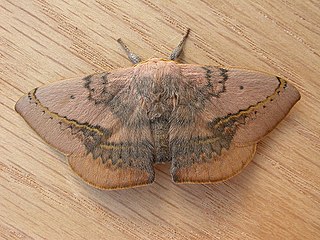
Anthela varia, the variable anthelid, is a moth of the family Anthelidae. The species was first described by Francis Walker in 1855. It is found in the coastal areas of southern Western Australia, southern Queensland, New South Wales, and Victoria.
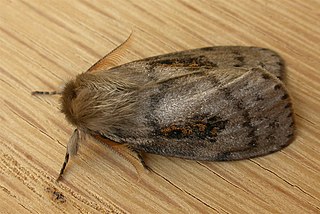
Leptocneria reducta, the white cedar moth, is a moth of the subfamily Lymantriinae. The species was first described by Francis Walker in 1855. It is found in all of Australia, except Tasmania.
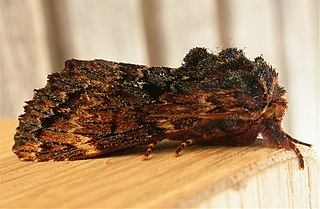
Sorama bicolor, the two-coloured notodontid, is a moth of the family Notodontidae first described by Francis Walker in 1855. It is found in Australia.

Pinara divisa, the common pinara, is a species of moth of the family Lasiocampidae. It was first described by Francis Walker in 1855. It is found in the south-east quarter of Australia.

Doratifera pinguis, the pale cup moth or sometimes the painted cup moth is a moth of the family Limacodidae. The species was first described by Francis Walker in 1855. It is found over the whole eastern seaboard of Australia.

Iropoca is a monotypic moth genus in the subfamily Lymantriinae erected by Alfred Jefferis Turner in 1904. Its only species, Iropoca rotundata, the iropoca moth, was first described by Francis Walker in 1855. It is found in the Australian states of Victoria, New South Wales and Queensland.

Porela vetusta, the ancient porela, is a moth of the family Lasiocampidae. It was first described by Francis Walker in 1855. It is found in the Australian states of New South Wales, Queensland, Tasmania and Victoria.
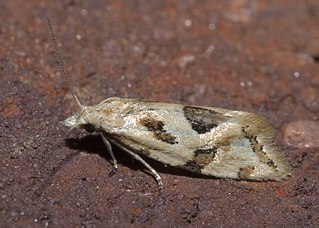
Aethes is a genus of moths belonging to the subfamily Tortricinae of the family Tortricidae.

Porela subfasciata, the fasciated porela, is a species of moth of the family Lasiocampidae. It was first described by (Francis Walker in 1855 and is known from the Australian states of Tasmania and Victoria.
Aethes pinara is a species of moth of the family Tortricidae. It is found on Cuba.
Lemyra maculifascia is a moth of the family Erebidae. It was described by Francis Walker in 1855. It is found in China, Indonesia, Timor, the Philippines, New Guinea and Australia. It is found in secondary habitats, including bush, clearings in primary forests and plantations, from the sea level up to elevations of about 1,200 meters.

Pinara obliqua is a species of moth.


















